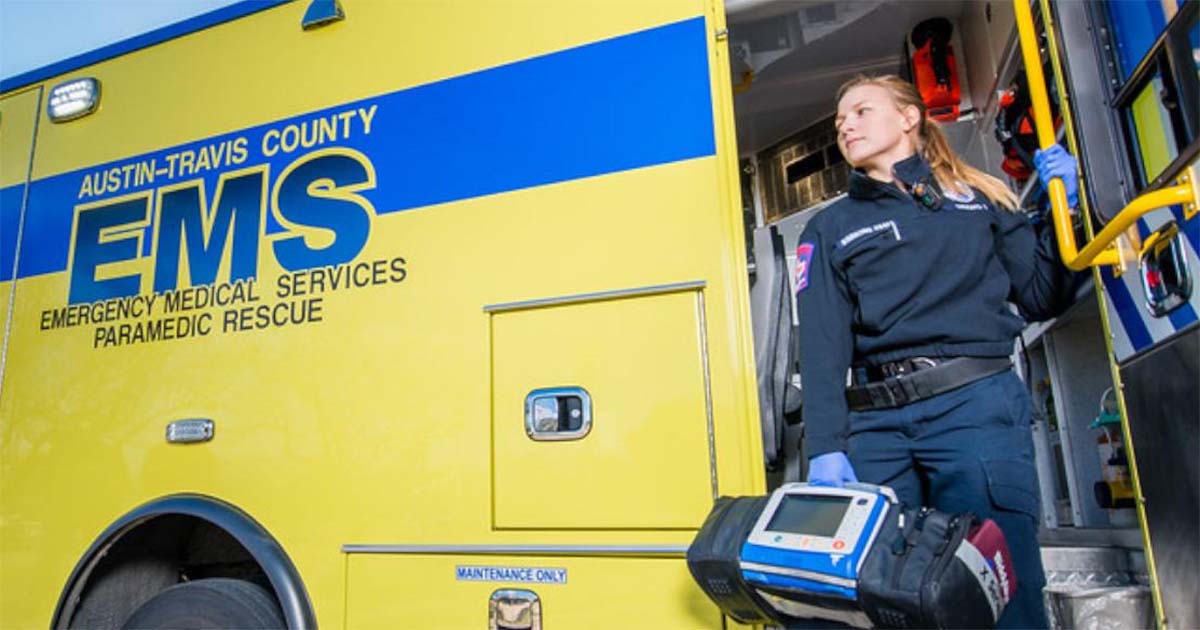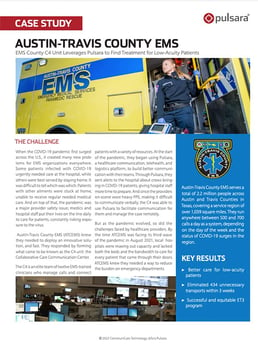Pulsara Around the World - February 2026
January Recap The start of 2026 was on the slow side for our events schedule, with our team heading to the Florida Fire & EMS Conference, the...
2 min read
 Team Pulsara
:
Jun 13, 2022
Team Pulsara
:
Jun 13, 2022

Editor’s Update: As reported by JEMS.com on 6/28/23, the federal government is ending the ET3 program. According to the Centers for Medicare & Medicaid Services, “This decision does not affect Model Participants’ participation in the Model through December 31, 2023.” Read the full article on JEMS for more details: ET3 Program Comes to an Abrupt End. Please be advised that Mobile Integrated Healthcare and Community Paramedicine are separate initiatives and are unaffected by the ET3 program termination.
__
When the COVID-19 pandemic first surged across the U.S., it created many new problems for EMS organizations everywhere. Some patients infected with COVID-19 urgently needed care at the hospital, while others were best served by staying home. It was difficult to tell which was which. Patients with other ailments were stuck at home, unable to receive regular needed medical care. And on top of that, the pandemic was a major provider safety issue; medics and hospital staff put their lives on the line daily to care for patients, constantly risking exposure to the virus.
Austin-Travis County EMS (ATCEMS) based in Austin, Texas, knew they needed to deploy an innovative solution, and fast. They responded by forming what came to be known as the C4 unit: the Collaborative Care Communication Center.
The C4 is an elite team of twelve EMS-trained clinicians who manage calls and connect patients with a variety of resources. At the start of the pandemic, they began using Pulsara, a healthcare communication, telehealth, and logistics platform, to build better communication with their teams. Through Pulsara, they sent alerts to the hospital about crews bringing in COVID-19 patients, giving hospital staff more time to prepare. And since the providers on-scene wore heavy PPE, making it difficult to communicate verbally, the C4 was able to use Pulsara to facilitate communication for them and manage the case remotely.
But as the pandemic evolved, so did the challenges faced by healthcare providers. By the time ATCEMS was facing its third wave of the pandemic in August 2021, local hospitals were maxing out capacity and lacked both the beds and the bandwidth to care for every patient that came through their doors. ATCEMS knew they needed a way to reduce the burden on emergency departments.
 That’s when the C4 unit decided to switch gears. The team began devoting their energy to optimizing their processes around the vast majority of their call volume: low-acuity patients who needed care, but not necessarily a trip to the emergency room.
That’s when the C4 unit decided to switch gears. The team began devoting their energy to optimizing their processes around the vast majority of their call volume: low-acuity patients who needed care, but not necessarily a trip to the emergency room.
Though all patients who call 911 need help, many times, the type of care they need isn’t found in an emergency room. The goal of the C4 unit is to coordinate personalized care for each patient. Instead of the one-size-fits-all approach of ferrying them to the ED, medics are empowered to get patients the most appropriate treatment for their needs, immediately.
In the first five days of using Pulsara to power the crew’s new goals, they were able to avoid transporting 154 people to the hospital. Instead, each patient received care specific to their needs and customized to their situation. Over the span of three weeks, the C4 unit was able to keep 434 low-acuity patients out of the hospital.
Download the case study to learn how Austin-Travis County EMS found ways to better care for low-acuity patients, reroute them to more appropriate care, and reduce the burden on their emergency department by significantly reducing their number of transports.
Community paramedics and clinicians from Teller County and Woodland Park, CO are using Pulsara to meet the needs of their community and help reach underserved populations. Watch the video to learn more.

January Recap The start of 2026 was on the slow side for our events schedule, with our team heading to the Florida Fire & EMS Conference, the...

Recent research shows how Pulsara was successfully leveraged to connect more than 6,000 COVID-19 patients to monoclonal antibody infusion centers via...

At Pulsara, it's our privilege to help serve the people who serve people, and we're always excited to see what they're up to. From large-scale...